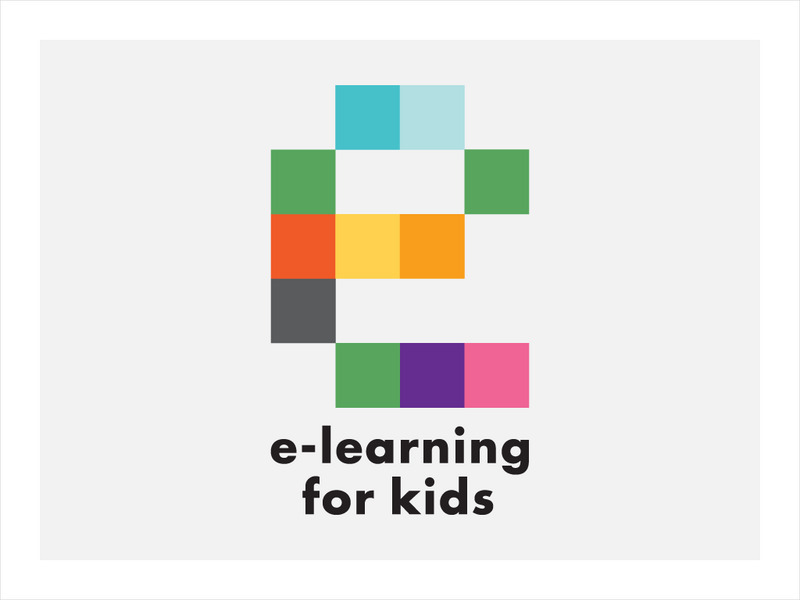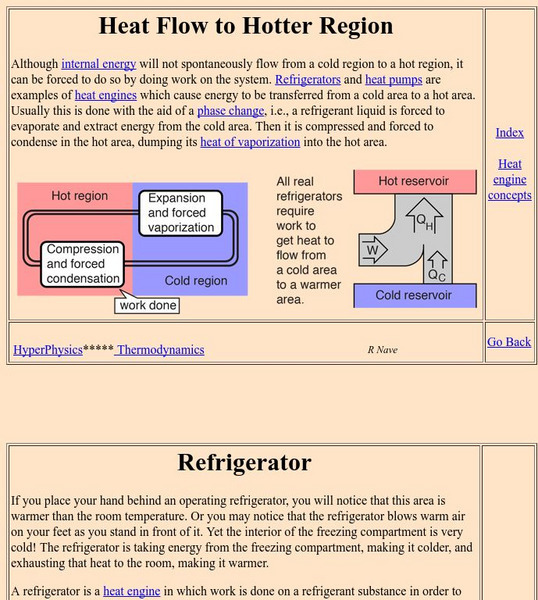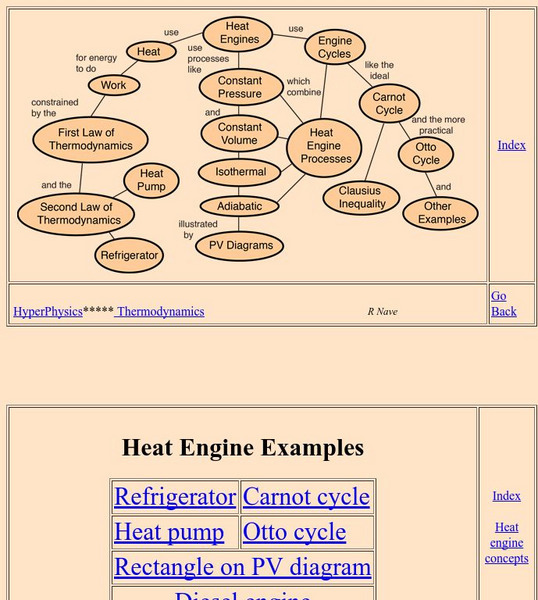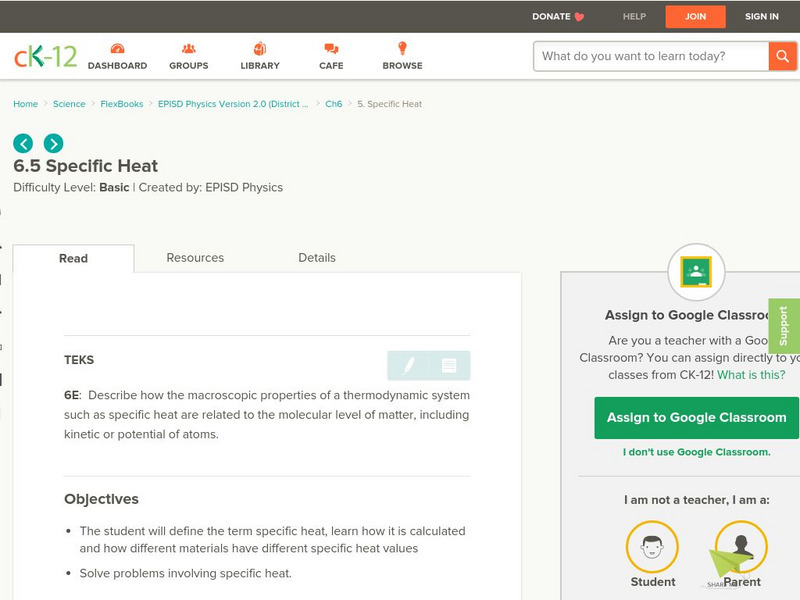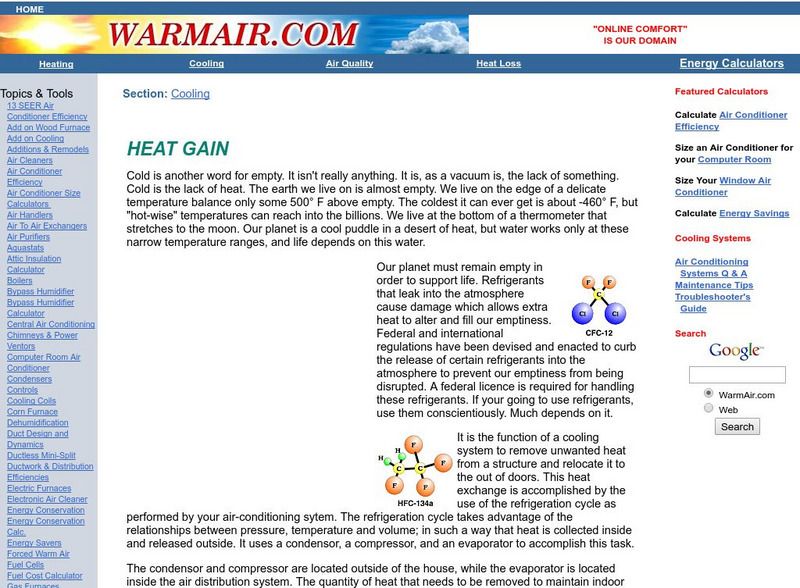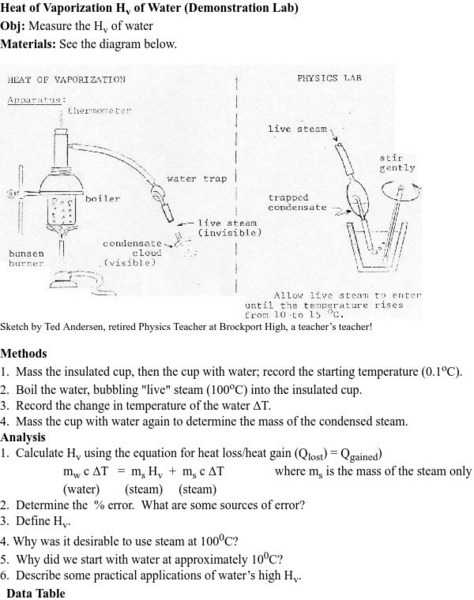E-learning for Kids
E Learning for Kids: Science Underwater City: What Are Good and Poor Conductors of Heat?
John and Jessi are going underwater, and they need to stay warm. Help them learn about conductors of heat so they can stay warm.
Georgia State University
Georgia State University: Hyper Physics: Heat Engine Cycle
The heat engine cycle is defined and discussed. So pressure-volume diagrams are introduced and their use in depicting the cycles of a heat engine is demonstrated. Informative graphics are accompanied by reason-filled explanations.
Georgia State University
Georgia State University: Hyper Physics: Area Expansion
The concept of area expansion is presented and explained. An equation for calculating the amount of area expansion is provided.
Georgia State University
Georgia State University: Hyper Physics: Heat Flow to Hotter Region
Heat flow from a hot region to a cold region is described and explained. Applications of this phenomenon (specifically heat pumps and refrigerators) are discussed. Excellent graphics.
Georgia State University
Georgia State University: Hyper Physics: Heat Engine Concepts: The Otto Cycle
Schematic diagrams illustrating the operation of a four-stroke engine cycle. Interactive buttons allow you to step through the various steps of each engine cycle. Each graphic is accompanied by an excellent explanation.
Georgia State University
Georgia State University: Hyper Physics: Heat Engine Concepts
An indexing page for the HyperPhysics site. The page contains a concept map of links to a variety of other pages which discuss concepts related to heat engines. All pages contain informative graphics and excellent explanations.
Georgia State University
Georgia State University: Hyper Physics: Heat Pump
Heat flow from a hot region to a cold region is described and explained. Applications of this phenomenon (specifically heat pumps and refrigerators) are discussed. Excellent graphics.
Science Struck
Science Struck: Conduction, Convection, and Radiation
Explains the concept of heat transfer and describes conduction, convection, and radiation which are the three modes of heat transfer. Includes formulas, examples, and applications.
University of Sydney (Australia)
Entropy and the Second Law of Thermodynamics [Pdf]
A set of printable pdf pages from the University of Sydney's "Thermal Physics Module" site. Entropy is defined and explained conceptually. The mathematical treatment of entropy is introduced. The second law of thermodynamics and its...
CK-12 Foundation
Ck 12: Specific Heat
[Free Registration/Login may be required to access all resource tools.] Students explore the concept of specific heat, learn how it is calculated, and find out how different materials have different specific heat values.
Curated OER
Ucar: About Temperature
This site from the University Corporation of Atmospheric Research provides a lengthy page covering numerous topics including the difference between heat and temperature, the use of different temperature scales, thermal expansion, how a...
Curated OER
Fund. Of Phys. Geography/energy, Temperature, and Heat
A page describing (in part) the distinction between energy, temperature and heat. Includes graphic illustrating the quantity of energy needed to transform water between its various states. Methods of thermal energy transfer (convection,...
University of Sydney (Australia)
Thermal Physics Module: Ideal Gases [Pdf]
A molecular model of a gas is introduced and explained. Assumptions behind the ideal gas law are presented. The ideal gas law is stated. Charles' law and Boyle's law are derived from the ideal gas law.
Other
Warmair.com: Heat Gain
An excellent page describing the variables lead to rising temperatures in the home. The causes and sources of such heat gain are identified and explained. Lays the groundwork for understanding the importance of and need for home air...
ClassFlow
Class Flow: Heat
[Free Registration/Login Required] This flipchart investigates how heat is produced and the effects of heating and cooling and demonstrates how a change in temperature indicates a change in heat. Students will sequence objects according...
Other
Physics Labs: Heat of Fusion (Hf) of Ice
A complete set of directions, notes and suggestions for a lab involving the determination of the heat of fusion of ice. Suitable for a student project or lab investigation.
Other
Physics Labs/heat of Vaporization (Hv) of Water
A complete set of directions, notes and suggestions for a demonstration involving the determination of the heat of vaporization of water. Suitable for a student project or lab investigation.
Other
Physics Labs/specific Heat (C) of Metal
A complete set of directions, notes, and suggestions for a lab involving the determination of the specific heat values for various metals. Suitable for a student project or lab investigation.
Other
Advanced Thermoelectric: Fundamental Thermoelectrics
Discusses the scientific principles (the Peltier effect) and the reliability and operation of thermoelectric modules. Includes a link to several other pages, one of which contains an animation of their operation.
Exploratorium
Exploratorium: Exhibit Cross Reference: Convection Currents
A description of a museum exhibit that illustrates convection and convection currents. Great idea stimulus for a student project or lab investigation.
Lawrence Berkeley National Laboratory
Berkeley Lab: University of California: Electromagnetic Radiation
This page defines electromagnetic radiation. Included are links to more information.
American Chemical Society
Middle School Chemistry: The Ups and Downs of Thermometers
Based on experimental observations, students describe, on the molecular level, why the liquid in a thermometer goes up when it is heated and down when it is cooled.
American Chemical Society
Middle School Chemistry: Changing State: Evaporation
Learn how substances change from a liquid to a gaseous state in the process of evaporation.
CK-12 Foundation
Ck 12: Physical Science: Boiling
A module reviewing over how vaporization occurs and its difference from evaporation. Also, review over the definition of boiling point. Module includes a video, pictures, explanation, and review questions.


